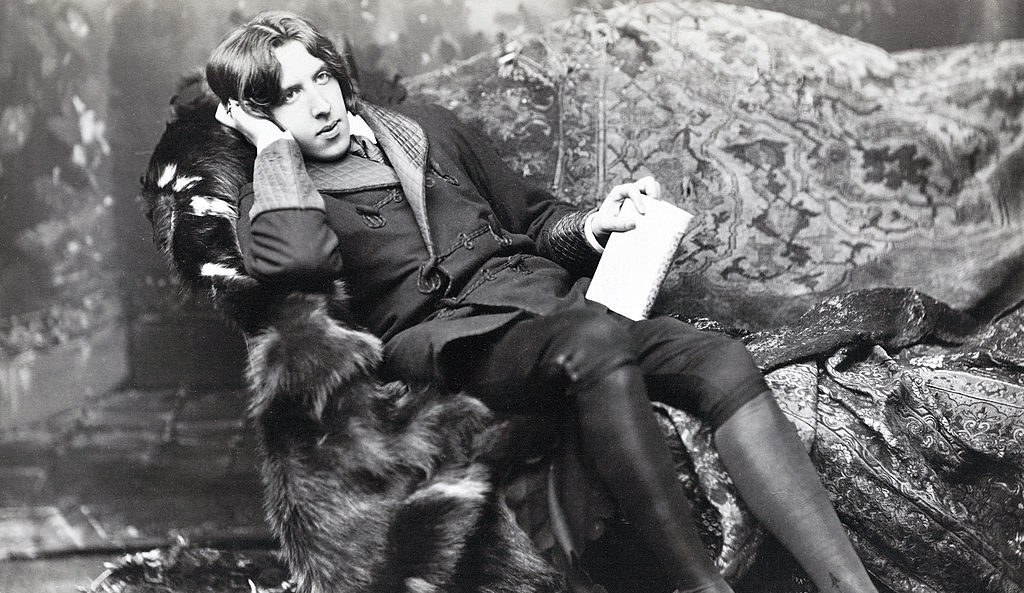Oscar Wilde’s reputed last words prove the iconic gay playwright kept his razor sharp wit till the very end

Oscar Wilde, Irish writer, in New York in January 1882. (DeAgostini/Getty Images)
Monday (May 25) marks 125 years since gay poet Oscar Wilde was imprisoned for “gross indecency” and sentenced for two years hard labour all for the “crime” of being gay.
Wilde, a flamboyant literary giant, found himself once again trapped inside four walls in 1900.
Exiled and penniless, he was sat in a fleapit hotel on the east bank of Paris, France. Life had replaced the cold, stone walls of his prison cell with the dull, dowry tones of floral wallpaper.
The Picture of Dorian Grey author had signed into the Maison du Perier, Due des Beaux Arts, in the Latin Quarter, under the name “Mammoth” several months prior.
The reputed last words of Oscar Wilde are as poignant as they are funny.
Part of our understanding of death is the deathbed scene. Loved ones shuffle around hospital beds as someone imparts their closing remarks of a life well-lived, sometimes imbued with wisdom or a simple expression of gratitude.
Somehow, Wilde’s reported final words are the most, well, Oscar Wilde thing Wilde ever said.
And at 3 o’clock in the afternoon of November 30, 1900, Wilde, 46, passed away after an ear infection that tumbled into meningitis. While nobody reported his last words, many attribute an arched, witty jab towards his greatest enemy as his reported final words.
“My wallpaper and I are fighting a duel to the death,” he remarked to a friend.
“One or other of us has got to go.”
And, some 100 years later after he died, the hotel replaced that cursed wallpaper with by red, blue, green and gold frescos based on designs by his friend Aubrey Beardsley.
In other words, it only took Wilde a century to finally enact his revenge against the floral wallpaper that plagued him in his final months.
Who was the iconic gay playwright?
Wilde, for years, rode the balm of opening nights of his successful plays, but they did little to blot the pain inside of him. Forced by a late Victorian society to suppress who he really was.
Homosexuality was, at the time, illegal in Britain. The flamboyant writer was married to Irish author Constance Llyod and had two children, but rumours of him being a “sodomite” rattled him.
Wilde was in an affair with Lord Alfred Douglas and even penned The Importance of Being Earnest. He was at the top of his game, but a legal case thrust upon him brought it all to an end in 1895 and he was charged with “gross indecency”.

Oscar Wilde. (Universal History Archive/Getty)
Over the following two years, Wilde was imprisoned in three separate prisons, most notably Reading Gaol, which inspired The Ballad of Reading Gaol.
While imprisoned at Pentonville Prison, Wilde was forced to walk hours every day on a treadmill and spent the rest of his days picking oakum. He was later transferred to Wandsworth Prison and it was there that his health began to deteriorate.
One day, he collapsed from hunger and exhaustion, rupturing an eardrum in the process. It is thought that this accident ultimately contributed to his untimely death.
In 2017, well over a century after his conviction, Wilde was one of an estimated 50,000 men who was pardoned by the British government for the “crime” of gross indecency.
Today, he is remembered as one of the greatest writers of the Victorian period. While his life ended in tragic circumstances, his plays, poems and novel have endured the test of time and are still widely loved today.

